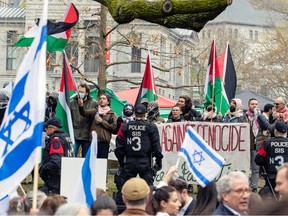Speaking to a House of Commons committee on Monday, the presidents of the two Montreal institutions defended their efforts to protect Jewish students.

Article content
The heads of McGill and Concordia have acknowledged that antisemitism is a “significant problem” at their universities.
They made the assertion Monday under questioning from Liberal MP Anthony Housefather at a House of Commons committee studying antisemitism on campuses.
Article content
Housefather said pro-Palestinian protesters at university encampments in Canada have been heard chanting: “Go back to Poland,” “Say it loud, say it clear, we don’t want no Zionist here,” and “Intifada, revolution — from the river to the sea.”
Advertisement 2
Article content
The Montreal MP asked the university presidents if they found such chants antisemitic.
“The way I hear them used right now on our campuses, including at McGill, I find it antisemitic,” McGill president Deep Saini responded.
Concordia president Graham Carr said: “They’re reprehensible and intimidating when chanted on campus.”
Earlier this month, Jewish university students — including McGill and Concordia representatives — told reporters in Ottawa that they are being forced to hide their Jewish identity and fear for their safety in the face of antisemitism.
They say hostility toward Jewish students has intensified since Oct. 7, when Hamas, which Canada considers a “terrorist entity,” attacked Israel, sparking an ongoing war.
Recommended from Editorial
In their opening remarks, Saini and Carr defended their efforts to protect Jewish students.
“Antisemitism is real,” Saini said. “It is happening across our country and we all have a role to play in confronting it.”
Article content
Advertisement 3
Article content
He added: “My commitment to ensuring that Jewish members of our campus community feel welcomed and supported at McGill is unwavering.”
McGill has long worked with Jewish students and faculty to put in place “measures to promote inclusion and provide avenues and resources to support the community,” he said.
Saini said the university now faces “a new challenge” due to a pro-Palestinian encampment on McGill’s front lawn, set up on April 27. He said the camp is “interfering with university activities,” and staff, students and faculty feel “intimidated.”
“Freedom of expression must be exercised with respect. In this regard, we’ve seen behaviours that repeatedly crossed the line and breached our policies.” That’s why McGill has asked Montreal police to intervene and has sought court injunctions to end the encampment, he said.
Saini said “the safety and well-being of McGill students, staff and faculty remain our top priority.”
In his statement, Carr said “many members of (the Concordia) community have suffered profound anguish, trauma and loss” due to the Israel-Hamas war.
Advertisement 4
Article content
“Our first responsibility is to show empathy and support for all,” he said.
“Everyone is struggling with the polarized environment and complexity of the challenges we face,” he added.
“What I can say categorically is that there’s no place for hate at Concordia. We’re all disgusted by the rise of antisemitism, the spread of Islamophobia and the proliferation of identity-based hatred and violence.”
Canadian universities “need to be places where people, above all our students, feel safe, where everyone can participate in campus life without fear of intimidation and harassment.”
Carr said an altercation in November 2023 between pro-Israeli and pro-Palestinian groups gave Concordia “a black eye (and) raised legitimate questions about how we both uphold our values and ensure a safe environment for everyone.”
Student groups had set up tables on campus — one to raise funds for Gaza and another to raise awareness about hostages taken captive by Hamas. Carr said two people were arrested, neither of whom were Concordia students.
In January, pro-Israeli and pro-Palestinian groups once again had tables next to one another, he said. “Were we nervous? Yes, but we had all learned from the bad experience in November. The mood was civil. There were no incidents.”
Advertisement 5
Article content
However, in March, Jewish members of Concordia’s Hillel club said they were harassed by masked pro-Palestinian protesters banging on walls and chanting, “All Zionists are racists, all Zionists are terrorists.”
Carr called that “a disgraceful attack by a small number of individuals.” He said security guards “intervened quickly, but it was another painful event for our community.”
He added: “Yes, tensions exist at Concordia, but there has also been a remarkable calm. This does not mean all is well. That’s why our commitment to combatting antisemitism and all forms of hate is ongoing.”
Housefather challenged one of Carr’s comments.
He said: “President Carr, respectfully, I don’t believe empathy should be the No. 1 goal. It should be protecting our kids and keeping our campuses safe of intimidation and harassment.”
The heads of the University of Toronto and the University of British Columbia also spoke to the committee.
Toronto-area Conservative MP Melissa Lantsman dismissed some of the university leaders’ assertions.
“You’ve said things like universities are no place for hate, there’s zero tolerance, it’s unacceptable,” she said.
However, “it has absolutely become a place for hate and you can see that in the testimony from students (and) faculty. … It has absolutely become a tolerant place for that hate and it has absolutely become acceptable on campuses.”
Advertisement 6
Article content
Article content





